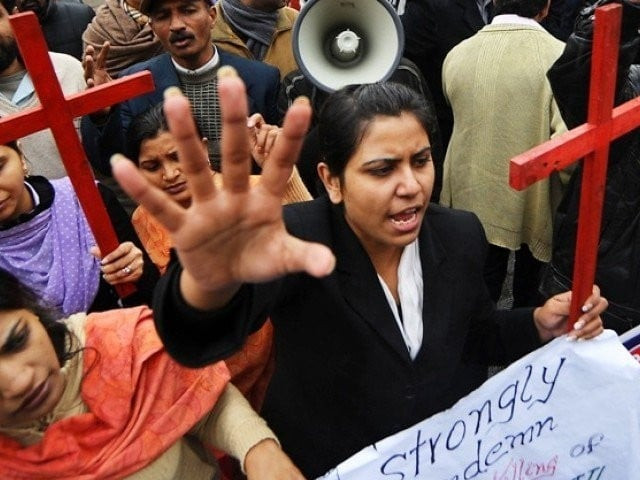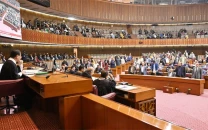US religious freedom panel eyes Pakistan with worry
Recommends Trump admin to declare it as ‘country of special concern’

File photo of Christians protesting. PHOTO: AFP
In January, the US State Department placed Pakistan on its special watch list for "severe violations of religious freedom".
The latest report noted the government and civil society’s efforts in dealing with sectarian conflicts and violence against minorities. According to the report, counter-terrorism actions persecuted by the Civil and military leadership under the National Action Plan included an explicit goal of countering sectarian hate speech and extremism.
The US, however, expressed serious concern over unidentified attackers who continued targeting and killing Shia, Hazaras, and Ahmadis in attacks believed to be religiously motivated, in Pakistan last year.
The report titled, "International Religious Freedom Report for 2017" complied by the United States Department of State Bureau of Democracy, Human Rights, and Labour, reveals that in 2017, in Pakistan, sectarian violent extremist groups continued to target Shia houses of worship, religious gatherings, religious leaders, and other individuals in attacks resulting in at least 112 persons killed during the year.
Religious freedom violations: Pakistan rejects being placed on US watch list
The record by some other organisations indicated that 220 members of the Shia community were killed in at least 18 sectarian incidents during the year.
The report paints a bleak portrait of religious freedom in Pakistan while pointing out major incidents of target killings, attacks on their places of worship, forced conversions, discrimination in various fields, societal violence related to allegations of blasphemy, amongst others.
It highlighted a number of major human rights violation incidents that made headlines last year, from brutal killing of Mashal Khan, a student at Abdul Wali Khan University in Mardan, KP accused of blasphemy, to attack on Qalander Sufi shrine in Sehwan, Sindh, in which at least 88 people were killed while more than 200 were injured who were gathered for a ritual.
“There were numerous reports of societal violence related to allegations of blasphemy; of efforts by individuals to coerce religious minorities to convert to Islam, including forced conversions of young girls; and of societal harassment, discrimination, and threats of violence directed at members of religious minority communities.
There also continued to be reports of attacks on the holy places, cemeteries, and religious symbols of religious minorities,” the report read.
The report, citing data from various civil society studies, says that there were at least 50 individuals imprisoned on blasphemy charges, at least 17 of whom had received death sentences. According to data provided by civil society organisations, police registered at least 10 new blasphemy cases against 17 individuals.
US places Pakistan on watch list for religious freedom violations
While the study pinpoints the efforts made at government level in combating intolerance and promoting dialogue on interfaith cooperation to increase religious freedom, it also highlights grave concerns of minorities, civil societies, human rights activists over lack of efforts or measures being taken by the government in safeguarding the minorities rights and freedom.
The US also mentioned some important meetings that took place between the senior officials from the US Department of State, including the Ambassador, the Special Advisor on Religious Minorities in the Near East and South and Central Asia, and embassy officers, with senior advisors to the prime minister, the minister for human rights, and officials from the Ministry of Law and Justice, Ministry of Foreign Affairs, and Ministry of Religious Affairs and Interfaith Harmony, to discuss the need to combat sectarian violence, to ensure the protection of religious minorities, and to limit the misuse of provisions of blasphemy law.
Embassy officers also met with civil society leaders, local religious leaders, religious minority representatives, and legal experts to discuss ways to combat intolerance and promote dialogue on interfaith cooperation to increase religious freedom.



















COMMENTS
Comments are moderated and generally will be posted if they are on-topic and not abusive.
For more information, please see our Comments FAQ